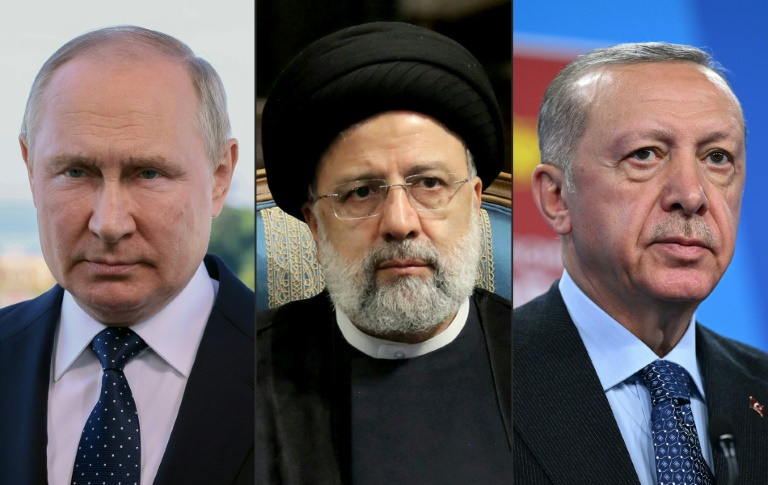Iran hosts Putin, Erdogan for talks

Russian President Vladimir Putin, Iran’s President Ebrahim Raisi, and Turkey’s President Recep Tayyip Erdogan
Tehran – Iran’s president will host his Russian and Turkish counterparts on Tuesday for talks on the Syrian war in a three-way summit overshadowed by fallout from the Russian invasion of Ukraine.
The summit is the first hosted by Iran’s ultra-conservative President Ebrahim Raisi since he took office last year, and the second trip abroad by Russia’s Vladimir Putin since he ordered the invasion of Ukraine in February.
It comes days after US President Joe Biden visited the Middle East for the first time since taking office, with stops in Iran’s regional foes Israel and Saudi Arabia.
But the trilateral summit is ostensibly centred on Syria, as part of the so-called Astana peace process to end more than 11 years of conflict in the Arab country.
All three are involved in Syria, with Iran and Russia supporting the regime of President Bashar al-Assad and Turkey backing rebel forces.
The gathering comes after Turkish President Recep Tayyip Erdogan threatened late last year to launch a new offensive in northern Syria against Kurdish militants.
Iran has already warned that any Turkish military action in Syria could “destabilise the region”.
The summit will also enable Erdogan to hold his first meeting with Putin since Russia invaded Ukraine in February.
The Turkish president has for months been offering to meet the Russian leader in a bid to help resolve heightened global tensions since the war began.
“The timing of this summit is not a coincidence,” Russian analyst Vladimir Sotnikov told AFP.
“Turkey wants to conduct a ‘special operation’ in Syria just as Russia is implementing a ‘special operation’ in Ukraine,” he said.
Turkey has launched waves of attacks on Syria since 2016, targeting Kurdish militias as well as Islamic State group jihadists and forces loyal to Assad.
– ‘Tensions and crises’ –
Putin and Erdogan, who arrived in Tehran on Monday, would meet in the Iranian capital on Tuesday to discuss mechanisms to export grain from Ukraine, a Kremlin source said.
The Russian invasion of Ukraine, which was launched on February 24, has massively hampered shipments from one of the world’s biggest exporters of wheat and other grain, sparking fears of global food shortages.
Turkey — a NATO member on speaking terms with both Russia and Ukraine — has spearheaded efforts to resume the grain deliveries.
Ultimately, Erdogan is hoping to get “the green light” to from Putin and Raisi for its military operation in Syria, said Sinan Ulgen, a visiting scholar at Carnegie Europe who specialises in Turkish foreign policy.
The news that Putin and Erdogan are to meet came on a day which saw EU foreign policy chief Josep Borrell warn Russia’s blockade of Ukrainian ports threatens supplies to countless thousands vulnerable to starvation.
Borrell dubbed the issue “one of life and death for many human beings.”
On Sunday, a day after Biden ended his tour of the Middle East, Iran accused the United States of provoking crises in the region.
Biden had vowed the US would not “tolerate efforts by any country to dominate another in the region through military buildups, incursions, and/or threats”, in a transparent reference to Iran.
In a speech in the Saudi city of Jeddah at a summit of Gulf Arab states as well as Egypt, Jordan and Iraq, Biden assured the leaders gathered that the United States would remain fully engaged in the Middle East.
“We will not walk away and leave a vacuum to be filled by China, Russia or Iran,” Biden said.
Following the meeting, a joint statement committed the leaders to “preserve regional security and stability”.
It also underscored diplomatic efforts to prevent Iran from developing a nuclear weapon, a goal the Islamic republic has always denied seeking.
On Sunday, Iran’s foreign ministry spokesman Nasser Kanani accused the United States of having “once again resorted to the failed policy of Iran-phobia, trying to create tensions and crises in the region”.
The United States said last week that Iran plans to deliver “hundreds of drones” to Russia to aid its war on Ukraine, an accusation the Islamic republic dismissed as “baseless”.
